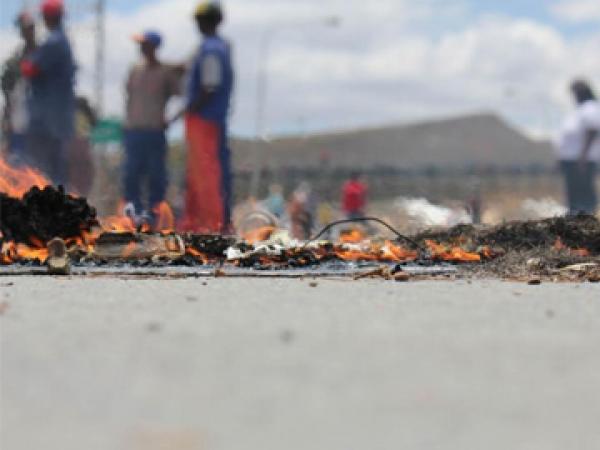Farm worker activists acquitted

Four activists and farm workers, arrested two years ago while marching in the Koo valley outside Montagu, have been acquitted.
Mercia Andrews, director of the Mawubuye Land Rights, one of her colleagues and two farm workers have spent thousands of rands defending themselves against charges relating to attending and convening a “prohibited gathering” outside Montagu during the farm workers’ strike. Andrews’ lawyers claimed throughout the trial, which ended in acquittal last Thursday, that she had merely attended the march to monitor the proceedings and to support workers who had organised themselves.
She and three other people were arrested by riot police, “without provocation”, she says, while leading workers in song as they were boxed in by police on the side of the main road through the fertile Koo valley on 4 December 2012.
“It was clear from the beginning that the police and prosecution could not stick any of the charges to us,” she said.
“We see the arrest and trial as having simply been part of a campaign of intimidation.”
The date of the march marked the resumption of the strike and a “day of mass action” across the Western Cape. It was the first time in history that workers in the Koo valley had marched in protest over low pay and exploitation at work, said Andrews. That march followed the sudden strike in which thousands of workers had blocked the N1 highway in De Doorns a month before. Throughout November 2012, the strikes spread to other regions in the fruit and wine producing Boland region - Ceres, Wolseley, Robertson, and Montagu.
In a statement accompanying news of the acquittal on Sunday, Andrews said that the arrests and lengthy trial were an insult to workers’ capacity to mobilise themselves.
“The state simply could not accept the fact that farm workers in the Koo Valley organised themselves. They simply could not accept that farm workers across the province decided to act in their own interest and that they had agency,” she wrote.
Karel Swart, general secretary of the Commercial, Stevedoring, Agricultural and Allied Workers Union (Csaawu), a close affiliate of Mawubuye in the Robertson-Montagu area, said that the acquittal of his four “comrades” was a victory for the union and workers in the region. The union, too, has been involved in protracted legal proceedings emanating from the 2012/2013 strikes and has rung up debt for legal fees of R600 000.
“We celebrate each victory,” said Swart.
“But, the reality is that there is a long way to go before justice for other farm workers - those who were dismissed during and after the strikes, and who continue to face unabated evictions from farms around the region.”
In June the Cape Town Labour Court threw out the case of 11 union members who were challenging their dismissal from the Steytler Boerdery for participating in the strike during January 2013. At the time, Swart said victory in the case was important for building a base upon which other dismissals during the strikes could be challenged. But Judge Anton Steenkamp found that the case had not been properly referred to the Commission for Conciliation, Mediation and Arbitration (CCMA) and, consequently the court did not have jurisdiction to hear the matter. He ordered Csaawu to pay the costs of the respondent, Steytler Boerdery. On Monday Swart confirmed that the CCMA would now hear the matter.
Further, Swart said that Csaawu would ask the National Union of Metalworkers of South Africa (Numsa), which was expelled from Cosatu at the weekend, for support.
“We support the idea of building a united front with Numsa and feel that their support can help to grow an environment where farm workers’ constitutional rights to have fair hearings on issues relating to dismissals and evictions can be upheld,” Swart said.
“For this to happen it is important for unionisation among workers to increase drastically. The aim over the next 10 years would be to get the percentage of unionised workers (nationally) up from 3 to 30%. We ask that Numsa make good on their commitment to mobilise with workers on the ground in order to remain relevant.”
Queries sent to the National Prosecuting Authority (NPA) asking for a response to the acquittal of the four activists had not been responded to at the time of publication.

This article is licensed under a Creative Commons Attribution-NoDerivatives 4.0 International License.


